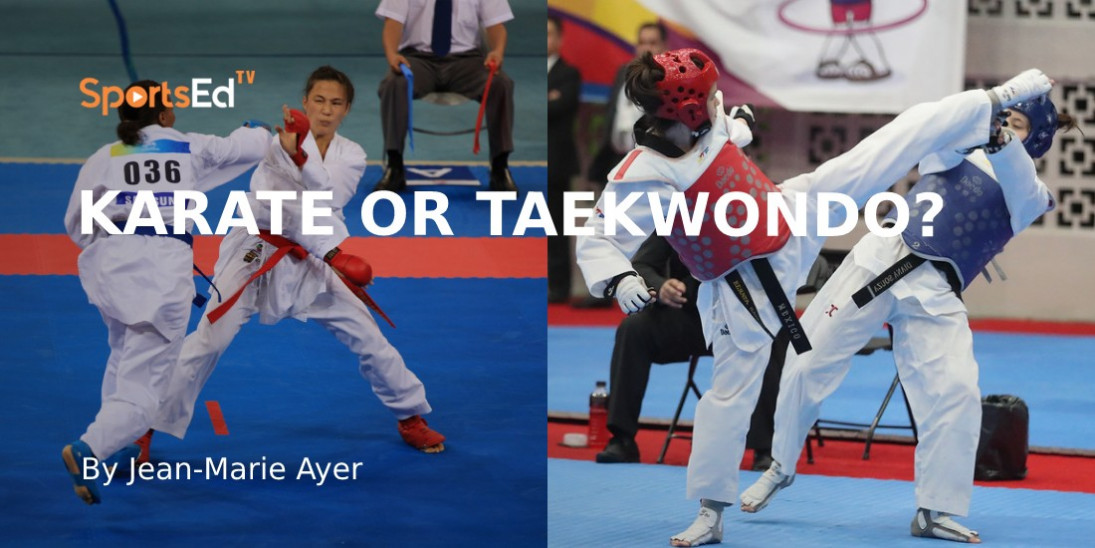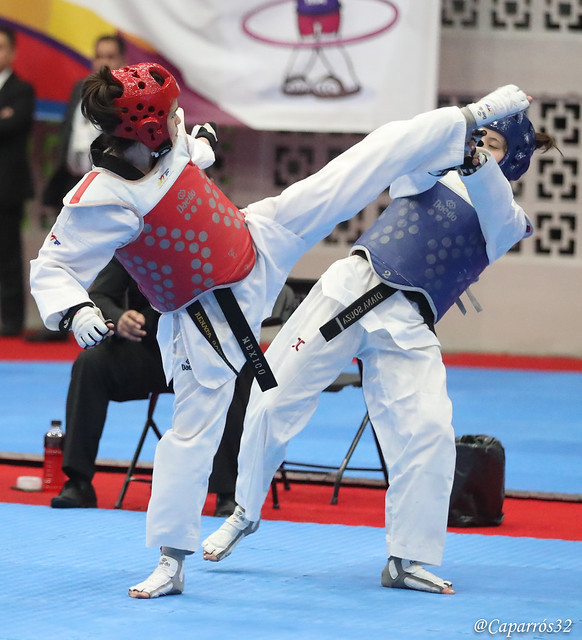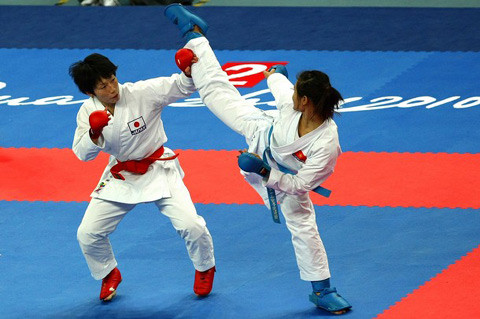Taekwondo, Martial Arts
Welcome and thanks for visiting...

What to choose: Taekwondo or Karate?

By Jean-Marie Ayer
You want to practice a martial art, and you do not know which one to choose. You are wondering whether to select Karate or Taekwondo.
These are two terms that you often hear. But you should know that there are many martial arts, each one more exciting than the other.
The term "martial art" is derived from Latin and means arts of Mars, the Roman god of war. A martial art is a style or school that mainly teaches fighting techniques with bare hands or weapons.
Historically, this learning process integrates a spiritual and moral dimension aiming at self-control-- essential to renounce combat if it is avoidable and to face it if it is not-- and is enriched by multiple knowledge notably, cultural, philosophical, and medical.
Thus, martial arts aim at the global development of the individual: external (strength, flexibility), internal (energy, health), intellectual, and moral. The history of martial arts goes back to the first ages of humanity and is characterized by a complex system of diffusion among cultures and regions. There is thus a multitude of martial arts in the world.
But let us return to Taekwondo and Karate. These two sports have acquired a worldwide reputation. The first one, thanks to its participation in the Olympic Games since the Sydney 2000 Olympic Games. Karate was made famous by the series Karate Kid by John G. Avidsen, whose first film was released in 1984.
But what are the differences and similarities between the two martial arts?
What is Taekwondo?
Taekwondo, also known as "the way of the foot and the hand," is a Korean martial art that has a rich and storied history dating back over 2,000 years. The roots of taekwondo can be traced back to the Hwarang warriors of ancient Silla, who were known for their exceptional martial skills and also for their honorable and chivalrous behavior. During the Goryeo dynasty, taekwondo evolved into a more organized fighting system that was used by the Korean military. During the 20th century, taekwondo was further developed and standardized as a sport in South Korea, and it quickly gained popularity around the world. In 2000, taekwondo became an Olympic sport, and it continues to grow in popularity to this day, with millions of practitioners in over 150 countries. "Tae" means to kick, "Kwon" means to strike or destroy with the hand, and "Do" means "the art or way of." So Taekwondo is a way to use the whole body to defend oneself.

As we know it today, Taekwondo began in 1955 when Korean masters decided to merge their different styles into a more uniform teaching method, which they called Taekwondo. Today, World Taekwondo, based in Seoul, Korea, sets the standards for competition rules and new sports developments.
What is Karate?
The first form of Karate appeared about 500 years ago on the Japanese island of Okinawa. Karate has both Japanese and Chinese influences, as both cultures were exposed to each other.
Okinawa's first known karate master, Funakoshi Gichin, was born in 1868 and devoted his life to spreading karate teachings throughout Japan. His disciples took up the torch and established the Japan Karate Association in 1949 to promote this martial art style. The first dojo (karate training facility) was opened in the United States in 1945.
Over the years, Karate has spread throughout the world, and different styles have begun to appear. Even if the styles have branched out, they are still considered Karate. Today, the most common and distinct styles are gÅju-ryÅ«, shitÅ-ryÅ«, Shotokan, and wadÅ-ryÅ«.
The World Karate Federation provides universal guidelines for the practice of the sport and competition at a professional level. The World Karate Federation is based in Madrid, Spain, and contributes to unifying styles to allow Karate to become an Olympic sport. The first success was recorded with participation in the Tokyo 2020 Olympic Games.

How is Karate different from Taekwondo?
The fundamentals of both Taekwondo and Karate emphasize self-discipline and a high code of personal conduct. Both martial arts have a competitive sport component, but it is only a part of the overall program. Both are excellent forms of martial arts training, each offering many benefits.
- Taekwondo emphasizes fast-kicking techniques. It includes learning blocks, punches, open-hand strikes, immobilizations, throws, and joint locks.
- Karate is known for its hand techniques, frequently includes knee and elbow strikes, and uses kicking techniques to a certain extent.
- Pre-determined sequences of techniques, usually called forms, are called poomsae in Taekwondo and kata in Karate.
- Taekwondo sparring involves body contact, but there are guards to protect from injury the parts of the body where it is allowed to hit. Karate fights are generally non-contact.
How do you choose between Karate and Taekwondo?
If you want to practice martial arts as a leisure sport, you will evaluate the club and the instructor. What are the training hours, and the quality of the equipment? What are the experiences and skills of the coach and his training methods? If you are a beginner, take a few trial lessons which the clubs often offer.
If you are an ambitious young athlete, you will consider the possibilities offered by both sports. As a permanent Olympic sport, Taekwondo has more to show in this respect.
First, suppose you are talented and willing to train seriously. In that case, you may have an Olympic appearance in your sights and obtain support from a National Olympic Committee investing in development programs for athletes with potential. You will be part of a structure that will support your training program at the athletic, nutritional, and psychological levels. Of course, there is a long way to go to get there, but it is possible.
And finally, Taekwondo offers an exciting part for ambitious athletes who do not want to fight. A good example is the Golden Buzzer obtained by the World Taekwondo Demonstration Team at America's Got Talent 2021. The team demonstrated spectacular taekwondo techniques performed with incredible timing and precision.
Either way, you won't go wrong. Taekwondo and Karate will allow you to work your whole body and will teach you patience and discipline.






